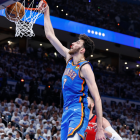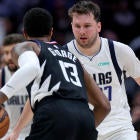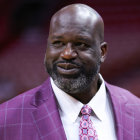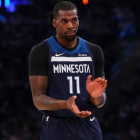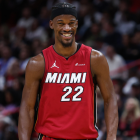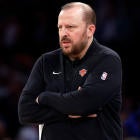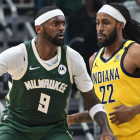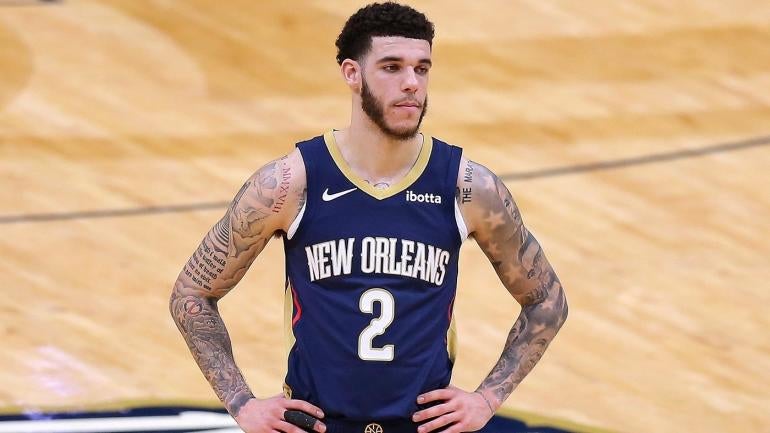
Signed and traded by the New Orleans Hornets, Lonzo Ball agreed to a four-year, $85 million contract with the Chicago Bulls on Monday. It might be tempting to take this as something of a formality -- a former No. 2 overall pick striking it rich coming off his rookie deal. But Ball had to earn this. He had to change his shot, his whole game in fact, and he had to do it with a bullet-biting humility that would seemingly bury a player who entered the league on a runaway hype train.
Technically, Ball has now been traded twice in four years. Magic Johnson tried to sell him as the next great Laker, but when LeBron James showed up, everything changed. LeBron was going to control things, and Lonzo was not equipped to succeed off the ball at the time. He couldn't catch and shoot to save his life, and his place as a core contributor, for any team let alone a winner, came into legitimate question almost overnight.
The Lakers went from envisioning his jersey in the rafters to shipping him to New Orleans in the Anthony Davis swap. As he watched fellow 2018 classmates Jayson Tatum, De'Aaron Fox and Donovan Mitchell sign max extensions as solidified franchise players, Ball wasn't offered a significant extension last summer.
He played the 2020-21 season under a cloud of uncertainty. Did the Pelicans see him as part of their future? What would his value be on the open market? If the Pelicans didn't have any competition for his services, he would've had to accept a lowball number.
Ball could've dwelled on things out of his control. Instead, he put his head down and got better. He reworked his shooting form to an almost unrecognizable degree -- surely a long, frustrating process as he fought to break the lifelong habit of swinging the ball across his body to release from the left side of his face -- and the results followed. Look at the leap he made from his final season with the Lakers to his two seasons in New Orleans, per Synergy.
*PPP = Points Per Possession
| YEAR | Catch & Shoot | Spot-Up | All Jump Shots |
|---|---|---|---|
2018-19 (Lakers) | 0.79 PPP (13th percentile) | 0.79 PPP (18th percentile) | 0.88 PPP (34th percentile) |
2019-20 (Pelicans) | 1.20 PPP (77th percentile) | 0.99 PPP (52nd percentile) | 1.01 PPP (62nd percentile) |
2020-21 (Pelicans) | 1.19 PPP (71st percentile) | 1.10 PPP (73rd percentile) | 1.07 PPP (70th percentile) |
That table is a portrait of hard work, and with Ball's increased success came an entirely new level of confidence. He nearly doubled his 3-point attempts from his last season with the Lakers (4.9 per game) to this past season with New Orleans (8.8). He occupied the corners far more frequently than he did in L.A., spacing the floor for Zion Williamson and Brandon Ingram. All told, 63 percent of his shots came from 3 this past season, up from 51 percent and 48 percent in his two seasons in L.A., per Cleaning the Glass.
In short, Ball, who had been led to believe, from his father on down, that he was a quintessential point guard his entire life, became an entirely different player on the fly. He's a shooter now. His biggest flaw has become one of his biggest strengths. Now all the other stuff he does -- defend, rebound, pass and push the ball with great pace -- isn't canceled out by the overwhelming hole in his game.

CBS Sports HQ Newsletter
Your Ultimate Guide to Every Day in Sports
We bring sports news that matters to your inbox, to help you stay informed and get a winning edge.
Thanks for signing up!
Keep an eye on your inbox.
Sorry!
There was an error processing your subscription.
Ball is not the franchise player he was supposed to be. But that's not what the Bulls paid for. He's not on a max deal like Tatum, Fox and Mitchell. He's not Trae Young or Luka Doncic. Ball is, very simply, a good basketball player, ironically understated, humble, and in general the complete antithesis of the center-of-attention image portrayed by his dad coming out of college.
In reality, Ball has always seemed better suited for the periphery. He's as solid a teammate as you could ever hope for. He's quiet. He plays hard. He will always make the right play for the team, simple or otherwise. He'll get rid of the ball quickly rather than wait for the assist; his ball-sharing instincts are often not flashy but are a dream for teammates, simple perimeter passes allowing everyone to feel organically involved in a single possession. He passes ahead rather than demanding to run the break. He doesn't force shots for the sake of stats or proving people wrong. He heard the criticism, but he waited until he was good enough to fire back with his jumper, not his mouth.
Ball has become a tailor-made player to put alongside Zach LaVine in Chicago. LaVine will control the ball and initiate offense as Ball will slot in comfortably as the floor-spacing shooter/secondary creator, which he's grown to be. He'll up LaVine's defensive ability with instinctive coverage and off-ball prowess, covering for him when necessary, and he'll up the IQ of that Chicago team considerably. Ball's teams haven't always won, but he's a winning player. Don't let anyone tell you otherwise.
And the best part about it is the workingman's path he took to this point. The world tried to roll out a red carpet to NBA stardom, but it wasn't for him. Things didn't go as planned. He had to look in the mirror and earn his place, and he did. No complaining. Just work. And a lot of belief when doubt was the cool thing to cast. And now, without ever making it about the money, he's become a very rich man.















